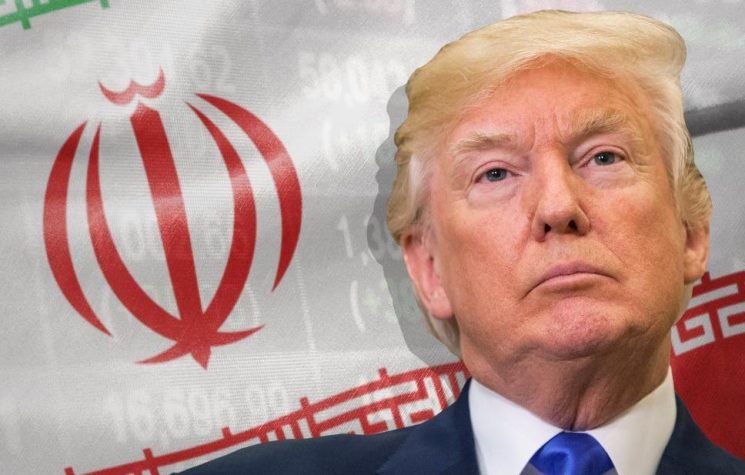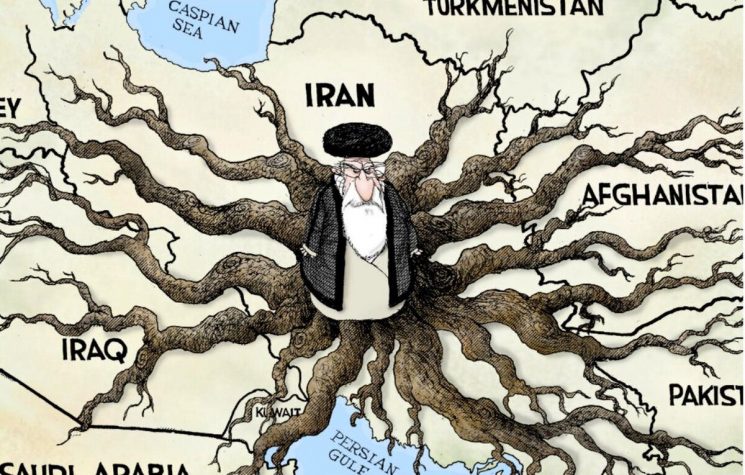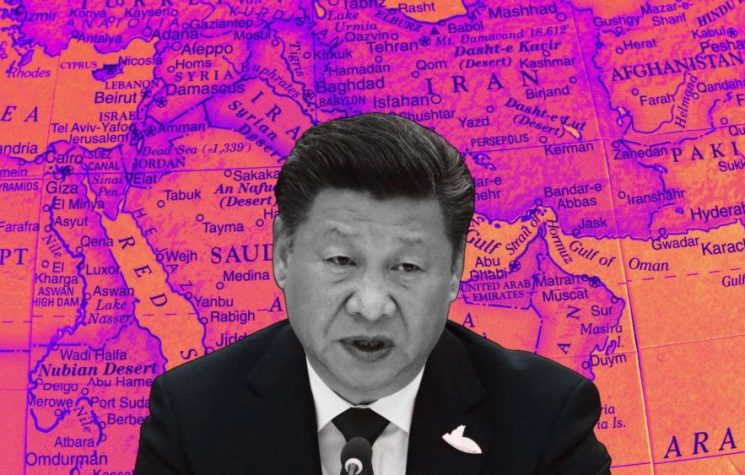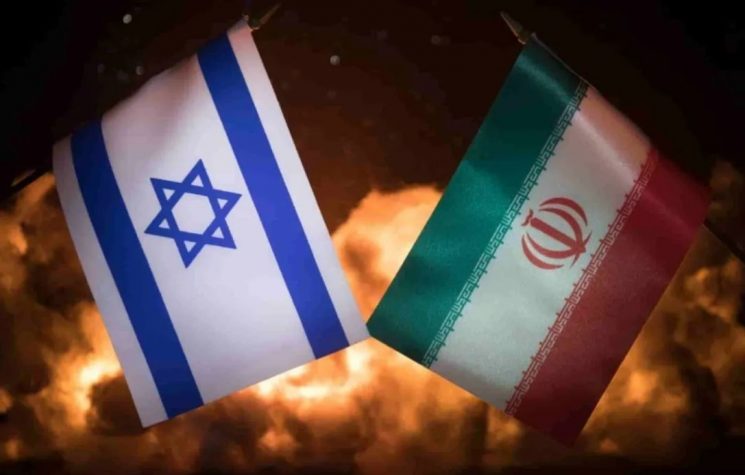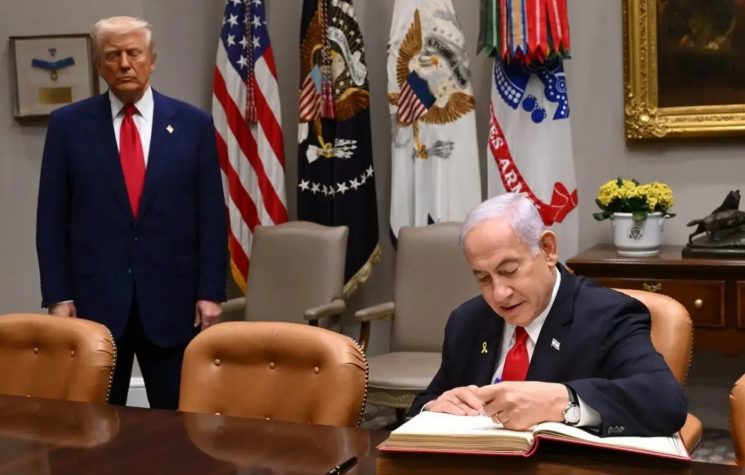Netanyahu is setting the stage for entrapment of the Biden Administration by manoeuvring so that the U.S. has little choice but to join with Israel.
❗️Join us on Telegram![]() , Twitter
, Twitter![]() , and VK
, and VK![]() .
.
Contact us: info@strategic-culture.su
The allegory is one in which a scorpion depends on the frog for its passage across a flooded river, by hitching a lift on the frog’s back. The frog distrusts the scorpion; but reluctantly agrees. During the crossing the scorpion fatally stings the frog swimming the river, under the scorpion. They both die.
It is a tale from antiquity intended to illustrate the nature of tragedy. A Greek tragedy is one in which the crisis at the heart of any ‘tragedy’ does not arise by sheer mischance. The Greek sense is that tragedy is where something happens because it has to happen; because of the nature of the participants; because the actors involved make it happen. And they have no choice but to make it happen, because that is their nature.
It is a story that was deployed by a former senior Israeli diplomat, well versed in U.S. politics. His telling of the frog fable has Israel’s leaders desperately fending off responsibility for the 7 October débacle, with a cabinet furiously trying to turn the crisis (psychologically) from culpable disaster – to present the Israeli public instead with an image of epic opportunity.
The chimaera being presented is one that by reaching back to earliest Zionist ideology, Israel can turn the catastrophe in Gaza – as Finance Minister Smotrich has long argued – into a solution that once and for all ‘unilaterally resolves the inherent contradiction between Jewish and Palestinian aspirations – by ending the illusion that any kind of compromise, reconciliation or partition is possible.
This is the potential scorpion sting: the Israeli cabinet betting all on a hugely risky strategy – a new Nakba – that could draw Israel into major conflict, but in so doing also sink what remains of western prestige.
Of course, as the former Israeli diplomat underlines, this ploy is essentially constructed around Netanyahu’s personal ambition – he manoeuvres to alleviate criticism and to stay in power as long as he can. More importantly, he hopes this will enable him to spread the blame, shedding all and any responsibility and accountability from himself. [Better still], “it can place Gaza in an historic and epic context as an event that might render the PM as a formative wartime leader of grandeur and glory”.
Far-fetched? Not necessarily.
Netanyahu may be writhing politically for survival, but he is a true ‘believer’ too. In his book, Going to the Wars, historian Max Hastings writes that Netanyahu told him in the 1970s that, “In the next war, if we do it right, we’ll have the chance to get all the Arabs out … We can clear the West Bank, sort out Jerusalem.”
And what is the Israeli cabinet thinking about the ‘next war’? It thinks ‘Hizbullah. As one minister noted recently, ‘after Hamas, we will turn to deal with Hizbullah’.
It is precisely the confluence of a lengthy war in Gaza (along lines established in 2006), and an Israeli leadership seemingly intent to provoke Hizbullah on to, and up, the escalatory ladder, which is causing red lights to flash inside the White House, according to the former Israeli diplomat.
In the 2006 war with Hizbullah, the entire urban populated suburb of Beirut – Dahiya – was levelled. General Eizenkot (who commanded Israeli forces during that war and is now a member in Netanyahu’s ‘War Cabinet’) said in 2008: “What happened in the Dahiya quarter of Beirut in 2006 will happen in every village from which Israel is fired on … From our standpoint, these are not civilian villages, they are military bases … This is not a recommendation. This is a plan. And it has been approved.”
Hence the Gaza treatment.
It is not likely that the Israeli War Cabinet seeks to provoke a full-scale invasion of Israel by Hizbullah (which would represent an existential threat); but Netanyahu and the cabinet might like to see the present exchange of fire on the northern border escalate to the point at which the U.S. feels compelled itself to rain some warning blows onto Hizballah’s military infrastructure.
With the IDF already striking 40 kms deep into Lebanon at civilians (a car with a grandmother and her three nieces was incinerated last week by an IDF missile), the U.S. concern at escalation is real.
This is what worries the White House, the diplomat says. Iran confirms that it received no less than three U.S. messages within one day telling Tehran that the U.S. is not seeking war with Iran. And an American envoy, Amos Hochstein, has been doing the rounds in Beirut insisting that Hizbullah must not escalate in response to Israeli cross-border attacks.
“Netanyahu’s reluctance to enunciate any ideas about the ‘day after’ in Gaza – and major and ominous escalatory developments in Lebanon – are creating a rift between U.S. and Israeli policies to the point that some in the Biden administration and Congress are beginning to think Netanyahu is trying to drag the Americans into a war with Iran”.
“[Netanyahu] ‘isn’t interested in a second front in the north with Hezbollah”, the former official says, adding however they [in the White House] believe that a U.S. strike against Iran’s provocations would potentially turn Netanyahu’s abject debacle into some kind of strategic triumph”.
“That is the same convoluted logic that guided him when he encouraged his soulmate, then-President Donald Trump, to unilaterally withdraw from the Iran nuclear deal in May 2018. That was also the underlying logic of his 2002 congressional hearing encouraging the Americans to invade Iraq, because it would “stabilize the region” and “reverberate” to Iran”.
These fears go to the core of the ‘tragedy’ that ‘has to happen’ – the frog very cautiously has agreed to carry the scorpion over the river-crossing, but wants a guarantee that given the nature of the scorpion, he won’t sting his benefactor.
Team Biden, likewise, doesn’t Trust Netanyahu. He does not wish to ‘be stung’ through being drawn into a quagmire war with Iran.
The sting is palpable: The Netanyahu cabinet is gradually and deliberately setting the stage for the entrapment of the Biden Administration by manoeuvring so that Washington has little choice but to join with Israel, were the war to widen.
Like in all classic tragedy, the outcome comes about because the actors involved make it happen; they have no choice, but to make it happen, because that is their nature. “Not only does the Israeli Premier dismiss any idea or request coming from Washington; Netanyahu explicitly wants the Gaza war to go on indefinitely without any political corollary”, the ex-official relates.
Consider too, Jake Sullivan’s explicit setting out of U.S. red-lines: No re-occupation of Gaza; no displacement of its population; no reduction of its territory; no political disconnection with the West Bank authorities; no alternative decision-making, save only the Palestinian – and no going back to the status quo ante.
Netanyahu simply rejects all these ‘lines’ in a single phrase: Israel, he said, would oversee and maintain “overall security responsibility” for an indefinite period of time. At a stroke, he undermines the U.S. identified end-game, leaving it to dangle in the cold winds of increasingly unsympathetic global and domestic sentiment, and the sands in the hourglass running out.
The Smotrich ‘end game’ is evident: Netanyahu is building popular domestic support towards a silent new ultimatum for Gaza: “emigration or annihilation”. This is anathema for Team Biden. America’s Middle East decades of diplomacy ‘is down the sink’.
Washington is observing with mounting unease the ‘horizontal military escalation’ across the region, and wonders whether Israel will survive this tightening noose. Yet, the U.S. has only limited means and time to constrain Israel.
Biden’s immediate backing of Israel is creating turmoil at home and entailing a political price that – with the election a year off – has consequences. It was perhaps ‘in Biden’s nature’ that he might believe he could ‘bear-hug’ Israel into compliance with U.S. interests. It is, however, not working – leaving him stuck with a scorpion on his back.
Some argue that the solution is simple: Threaten to cut off the supply of munitions or funding that are flowing to Israel. It sounds simple. It would constitute a powerful ‘threat’; but for this to happen, it would require Biden to confront the all-powerful ‘Lobby’ and its tight hold over Congress. And this is not a contest that he likely would win. Congress stand solidly with Israel.
Some suggest that a resolution in the UN Security Council could impose ‘a stop to the Gaza nightmare’. But Israel has a long history of simply ignoring such resolutions (from 1967 to 1989, the UN Security Council adopted 131 resolutions directly addressing the Arab–Israeli conflict, most of which have had little or no impact). On Wednesday this week, the UNSC approved a resolution calling for humanitarian pauses.The U.S. abstained, and most likely, the resolution will be ignored.
So might a world-wide call for a two-state solution fare any better? It hasn’t so far. Yes, theoretically the UNSC can mandate a resolution, but the U.S. Congress would ‘go nuts’ if it did, and would threaten force on anyone attempting to implement it.
However, put bluntly, the two-state rhetoric misses the point: It is not only the Islamic world that is undergoing angry popular transformation – so too is Israel. Israelis are angry and passionate, and with an overwhelming majority, approve of the annihilation in Gaza.
Netanyahu’s contextualising of the Gaza war in absolute Manichean terms – light versus the dark; civilisation versus barbarism; Gaza as the seat of evil; all Gazans complicit with Hamas evil: Palestinians as non-human – all this is stirring Israeli emotions, and memories of a 1948-style ideology.
And this is not confined to the Right – popular sentiment in Israel is shifting from liberal-secular, to biblical-eschatological.
The Chair of B’Tselem’s Executive Board, Orly Noy, has written an article – The Israeli Public has Embraced the Smotrich Doctrine – that underlines how the internalization of Smotrich’s ‘Decisive Plan’ is manifest in popular support for Israel’s ‘emigration or annihilation’ Gaza policy:
“Six years ago, Bezalel Smotrich, then a young Knesset member in his first term, published his thinking of an endgame for the Israeli-Palestinian conflict … Instead of maintaining the illusion that a political agreement is possible, he argued, the issue must be unilaterally resolved once and for all.
[The solution Smotrich proposed was to offer] “the 3 million Palestinian residents a choice: to renounce their national aspirations and continue living on their land in an inferior status, or to emigrate abroad. If, instead, they choose to take up arms against Israel, they will be identified as terrorists and the Israeli army will set about “killing those who need to be killed.” When asked at a meeting, in which he presented his plan to religious-Zionist figures, if he also meant killing families, women, and children, Smotrich replied: “In war as in war””.
Orly Noy argues that this thinking is not simply confined to the Cabinet or the Israeli Right – rather, it has gone mainstream. Israeli media and political discourse shows that when it comes to the current IDF assault on Gaza, large parts of the Israeli public have completely internalized the logic of Smotrich’s thinking.
“In fact, Israeli public opinion regarding Gaza, where Smotrich’s vision is being implemented with a cruelty that even he may not have foreseen, is now even more extreme than the text of the plan itself. That’s because, in practice, Israel is removing from the agenda the first possibility on offer — of an inferior, de-Palestinianised existence — which until 7th October was most Israelis’ chosen option”.
The implication to this ‘Smotrichization’ of the public is that Israel – as a whole – is turning radically allergic to any form of Palestinian state existing at all. The public, she observes, have now come to see the Palestinians’ refusal to submit to the might of the Israeli military as an existential threat in itself – and sufficient reason for their displacement.













